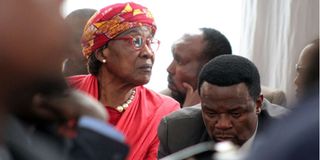Saba Saba - Memories from 1990

Sirisia MP John Waluke (right) and his associate Grace Wakhungu during a past court session.
What you need to know:
The rally was organized by a coalition of opposition leaders, activists, and civil society groups. zzzz
Introducing articles with audio
Listen to the audio version below:
Saba Saba, which means "seven seven" in Swahili, refers to July 7, 1990, a significant date in Kenyan history. On this day, a major political rally was held at the Kamukunji grounds in Nairobi, Kenya. The event marked a turning point in the country's struggle for multi-party democracy and paved the way for political reforms.
During this period, Kenya was under the authoritarian rule of President Daniel arap Moi, who had been in power since 1978. The political landscape was dominated by the ruling party, Kenya African National Union (KANU), and opposition parties were banned.
The Saba Saba rally was organized by a coalition of opposition leaders, activists, and civil society groups who were advocating for the restoration of multi-party democracy and an end to one-party rule. Prominent opposition figures like Kenneth Matiba and Charles Rubia were key leaders in the movement.
On the morning of July 7, 1990, thousands of Kenyans gathered at Kamukunji grounds to demand political change and democratic reforms. However, the government responded with a heavy-handed approach. Riot police were deployed to disperse the crowd, leading to violent clashes and the use of tear gas. Tragically, at least 20 people were killed in the confrontation, and many others were injured.
Despite the violence, the Saba Saba rally galvanized the opposition and drew international attention to the demand for democratic reforms in Kenya. It marked a turning point in the struggle for multi-party democracy, and the pressure generated by the event eventually led President Moi to relent. In December 1991, he announced the repeal of Section 2A of the Kenyan constitution, which had declared Kenya a one-party state. This move opened the way for the re-introduction of multi-party politics in Kenya.
In the years following Saba Saba, political reforms were gradually implemented, and opposition parties were legalized. The first multi-party elections since independence were held in 1992, ushering in a new era of competitive politics in Kenya.
Today, Saba Saba is remembered and commemorated as a significant milestone in Kenya's struggle for democracy and political pluralism. It serves as a reminder of the importance of citizen activism and the collective quest for political change in the face of authoritarian rule.




